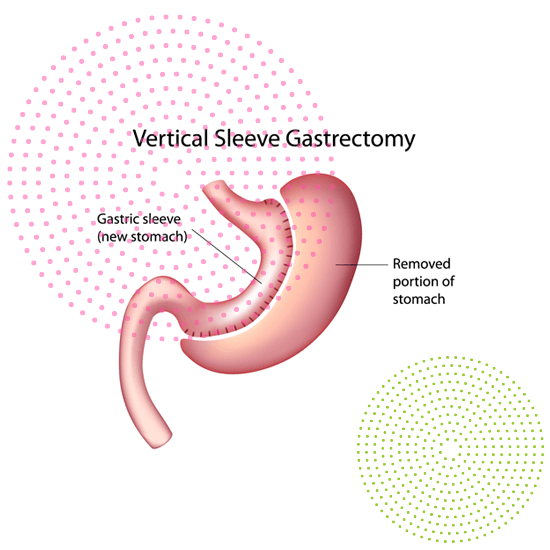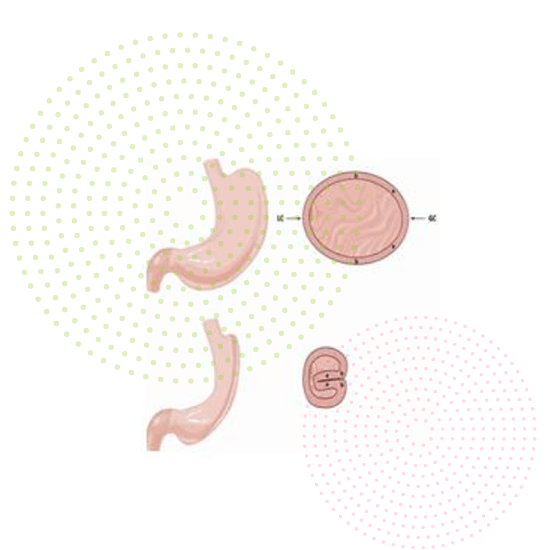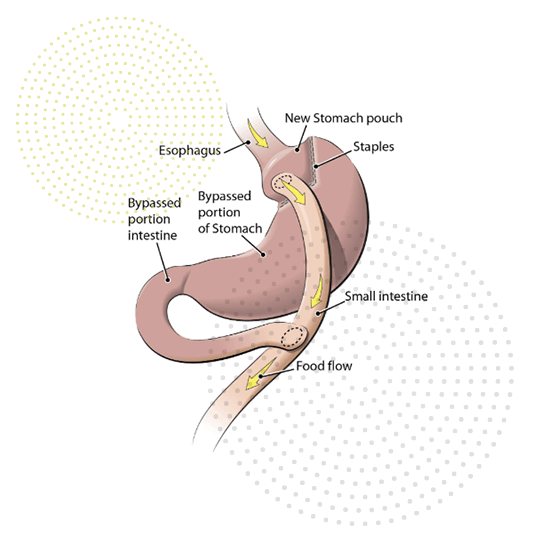
Laparoscopic Sleeve Gastrectomy
In the gastric sleeve about 75% of the stomach is removed leaving a narrow gastric “tube” or “sleeve”. No intestines are removed or bypassed during the laparoscopic sleeve gastrectomy. This procedure takes one to two hours to complete.
The Sleeve Gastrectomy is a restrictive procedure. It significantly reduces the size of your stomach and limits the amount of food that you can eat at one time. However, it does not cause decreased absorption of nutrients. After eating a small amount of food, you will feel full very quickly and continue to feel full for several hours.
You may have a decrease in appetite. In addition to reducing the size of the stomach, Sleeve Gastrectomy reduces the amount of "hunger hormone" produced by the stomach, which contributes to weight loss after this procedure.
Laparoscopic Gastric Plication
Gastric Plication consists of sewing one or more large folds in your stomach. During the Laparoscopic Gastric Plication the stomach volume is greatly reduced up to 70%, which makes the stomach able to hold less food, therefore helping you eat less. The stomach and intestines are not cut, stapled or removed during this procedure. The Gastric Plication may potentially be reversed or converted to another procedure if needed.
The Gastric Plication procedure is minimally invasive and takes approximately one to two hours to complete. Most patients stay in the hospital for 1-2 days after the procedure.
Gastric Plication is a restrictive procedure. It greatly reduces the size of your stomach and limits the amount of food that you can eat at one time. It does not cause decreased absorption of nutrients or bypass your intestines. After eating a small amount of food, you will feel full quite quickly and continue to do so for several hours. Gastric Plication may also cause a decrease in appetite.

Gastric bypass (ROUX-EN-Y) and Mini gastric bypass
- During the first step the surgeon will use staples to divide your stomach into a small upper section that is called “the pouch” (where the food you eat will go) and a larger bottom section.
- The pouch will hold approximately 1 ounce of food, as a result you will decrease your food intake and lose weight. This part of the procedure is called Restrictive.
- The second step will be the bypass. The pouch will be connected to your jejunum that is part of your small intestine. This will bypass the food that you ingest from the duodenum, going from your pouch directly to your small intestine, resulting in lower calorie absorption. This part of the procedure is called Malabsorptive.


Revision Surgery
The primary reasons for revision of prior bariatric procedures are:
- Anatomic failure with persistent or recurrent obesity
- Development of secondary complications
- Need for reversal
In some cases patients may not respond well to their first operation presenting insufficient weight loss. Revision surgery is the best option for patients who did not reach their optimal weight loss in the initial operation. Dr. Venecia Hernández León is positive that she can provide patients with effective tools needed to succeed.
Because of Dr. Venecia Hernández León vast experience with weight loss revision surgeries, patients across the United States and Mexico seek her expertise when in need of additional weight loss surgery. The majority of these patients have had their previous procedure elsewhere.
To determine if a patient qualifies for bariatric revision surgery, Dr. Venecia Hernández León encourages potential patients to contact Obesity Free Life Bariatrics to make an appointment for a FREE consultation.
Lap band revision surgery
When the banding system is ineffective for a particular patient, the following step in the weight loss process is often to remove the band and perform the gastric sleeve operation.
This procedure endows the next benefits:
- The swallowing reflex is much easier with the gastric sleeve
- Vomiting and choking are rare because there is no device to restrict passage of food
- A drop in hunger hormones allows patients to better control their appetites
We suggest if you are displeased with your previous weight loss surgery and you are committed to lead a healthier life, contact Obesity Free Life Bariatrics NOW to review the available options in a personalized consultation with Dr. Venecia Hernández León.
Is bariatric surgery a good choice for me?
Dr. Venecia H. León may explain to you how the Gastric Sleeve procedure can be an option if you have a BMI over 27 with one or more co-morbid medical conditions, which are generally expected to be improved, reversed, or resolved by weight loss. She will discuss all of the available surgical procedures with you and determine which procedure is best for you.
